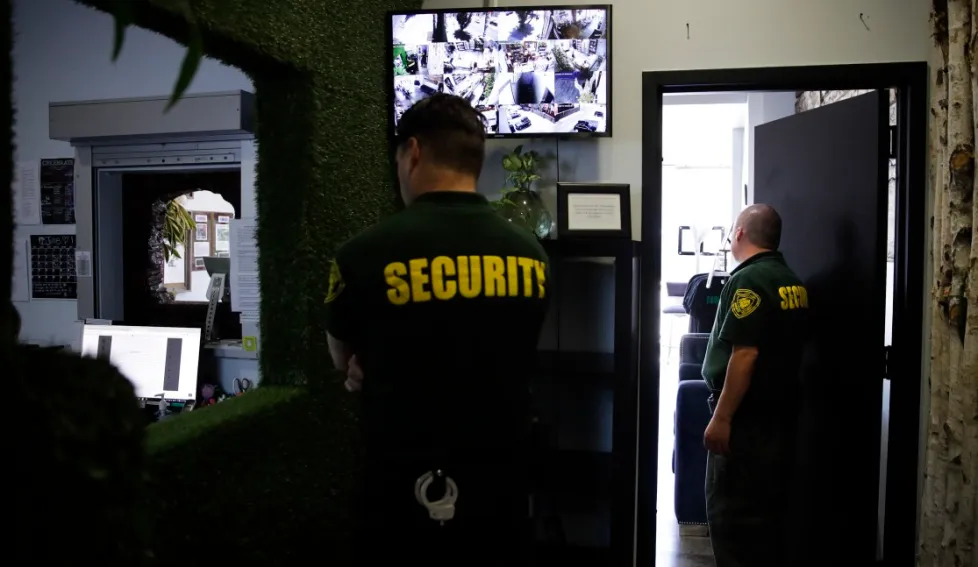The Complete Guide to Dispensary Security: Best Practices to Enhance Cannabis Store Security
Table of Contents
Introduction
Operating a cannabis dispensary comes with a unique set of challenges and security risks. As the demand for cannabis products continues to rise, dispensaries have become lucrative targets for criminals. Moreover, in the current environment, where rioting and looting are becoming more prevalent, these establishments are at an increased risk. In this comprehensive guide, we will explore the best practices for enhancing cannabis store security, covering both physical and cybersecurity measures.
The Importance of Dispensary Security
Dispensaries face a higher level of security threats compared to traditional retail stores due to the nature of their business. Cannabis dispensaries deal with cash transactions and valuable products, making them attractive targets for criminals. Moreover, the legal and regulatory landscape for cannabis businesses adds complexity to security requirements.
The Two Sides of Dispensary Security
Dispensary security can be broadly categorized into two main areas of concern: physical security and cybersecurity. Let’s delve into each of these aspects to understand the specific risks and strategies associated with them.
Part I: Physical Dispensary Security
Identifying Vulnerabilities
Before implementing security measures, it’s crucial to identify potential vulnerabilities in your dispensary’s physical security. Here are some questions to consider:
- Do you have a reliable alarm system?
- Is the interior and exterior of your dispensary well-lit?
- Are your cannabis products displayed in safe, secure locations?
- Do you have sufficient security staff?
- Do you have a comprehensive surveillance system?
- Are your delivery vehicles armored and secure?
- Are you operating your dispensary according to your state’s regulations for cannabis security?
If you find any weaknesses in your current security setup, it’s essential to address them promptly.

Creating a Secure Perimeter
Establishing a secure perimeter is the first step in protecting your dispensary. The size and scope of this perimeter should be determined based on your store’s needs and potential risks. Key components of a secure perimeter include surveillance, fencing, and lighting.
Video Surveillance Systems
High-resolution cameras with day and night functionality should be strategically placed both inside and outside your dispensary. These cameras not only help establish a perimeter but also surveil the interior to deter shoplifting and monitor internal theft.
The best cannabis surveillance systems should meet specific criteria:
Provide high resolution:
Invest in cameras with high-resolution capabilities to enhance threat identification. A 4K resolution camera is the highest quality, but a 1080p Full HD camera can still be effective.
Function well, day or night:
Ensure that your security cameras feature long-range infrared night vision. This ensures that your cameras can capture images in low or no light conditions.
Weatherproof and vandal-resistant:
Install security cameras with an IP66 or IP67 weatherproof rating and vandal-proof housing to ensure they can withstand the elements and potential tampering.
Lighting
Proper lighting around your dispensary is essential to deter criminals. Consider the following lighting options for dispensary security:
High-Intensity Discharge (HID):
These lights provide bright illumination for outdoor areas such as parking lots and garages. They cover a large area, making them ideal for commercial structures.
Motion-activated lights:
These lights act as a form of alarm system, illuminating when an intruder enters the vicinity, deterring them in the process.
Parking lot lights:
Mounted on poles, these lights provide ample illumination for large parking lots and structures.
Wall pack lights:
Mounted on building walls, these lights provide lighting for entrances, exits, garages, and other essential exterior areas.
Fencing
Select the right type of fencing to secure your dispensary’s perimeter. Common options include:
- Aluminum fences: These are durable, easy to maintain, and reasonably priced. Their design makes them difficult to climb.
- Chain link fences: Known for maximum protection and durability, they can withstand extreme weather conditions.
- Wood fences: These provide both security and privacy, are cost-effective, and offer wind protection and noise reduction.
When installing fencing, ensure that all external mechanical and electrical devices are secured, special areas are fenced off, and gates have heavy-duty padlocks.
Securing the Inside of Your Dispensary
Once you have established a secure perimeter, it’s time to focus on protecting the inside of your dispensary. Consider the layout of your store and the movement of customers and employees when implementing security measures.
Reinforced Glass
Windows are vulnerable points in your store’s physical security. Explore alternatives like:
- Safety and security window film: Applied directly to existing glass, this film holds glass together upon high impact, delaying burglary attempts.
- Laminated safety glass: Consisting of a robust thermoplastic interlayer between two glass layers, this glass is significantly stronger than traditional safety glass.
- Polycarbonate panels: Composed of acrylics, polycarbonates, and other plastics, these panels resemble glass but offer enhanced security, making them virtually unbreakable.
Alarm Systems
Deploy effective alarm systems, including:
- Glass break detectors: Choose from acoustic or shock detectors to sense breaking glass.
- Motion detectors: Monitor heat or energy changes to detect unauthorized movement.
- Panic buttons: Signal incidents in progress to law enforcement, either remotely or hard-wired in your shop.
Locks and Secure Storage
Depending on your dispensary’s layout, you may require secure storage areas for cannabis products. Use the following to restrict access to sensitive areas:
- Safes: For smaller dispensaries, choose TL-rated safes that adhere to industry security standards.
- Vaults: Larger dispensaries may require a secure vault for inventory storage. Ensure it meets stringent security requirements.
- High-security doors and locks: Reinforce entry points with high-quality doors and locks, resisting forced entry.
Hire a Security Officer
Consider hiring armed security personnel to deter criminal activity and provide an immediate response in case of security threats. Well-trained security officers can also reduce internal theft, which is a significant concern for dispensaries.
Secure Staff
Employee theft is a significant concern for dispensaries. Implement the following strategies to minimize the risk of internal theft:
- Background checks: Conduct thorough background checks on all potential hires to identify any criminal history or other red flags.
- Employee accountability procedures: Establish clear protocols for handling and securing cash, cannabis products, and other valuable items.
- Security training: Provide comprehensive security training to all staff members to ensure they understand and adhere to security policies and procedures.
Choose Security Solutions Wisely
Ensure that all security equipment and services meet industry standards and regulatory requirements. Work with cannabis-specific security consulting partners who specialize in the unique compliance and risk factors of the cannabis industry.
Part II: Dispensary Cybersecurity
While physical security is critical, dispensaries must also prioritize cybersecurity to protect sensitive data, customer information, and business operations. The cannabis industry’s rapid growth has made it a prime target for cyberattacks.
The Importance of Cannabis Dispensary Cybersecurity
Cannabis companies face specific cybersecurity challenges due to factors like the industry’s newness, small business size, and the importance of customer privacy. Protecting data is crucial, as patient identity information should be treated as seriously as healthcare data.
Dispensary Cybersecurity Best Practices
To safeguard your dispensary’s digital assets and customer data, follow these essential cybersecurity best practices:
Implement Multi-Factor Authentication (MFA)
MFA adds an extra layer of security by requiring users to provide multiple forms of verification before accessing systems or data. It limits the impact of password breaches and reduces vulnerability to phishing attacks.
Secure Your Website
Your dispensary’s website is a critical part of your business. Secure it by:
- Using a Web Application Firewall (WAF): This monitors, filters, and blocks data packets, protecting against common web-based attacks.
- Regularly scanning for malicious code: Perform regular scans to detect and remove any malicious code that could compromise your website’s security.
- Performing regular backups: Ensure data recovery in case of a breach by regularly backing up your website’s data.
- Installing a Secure Socket Layer (SSL) certificate: This encrypts the connection between your website and its visitors, keeping sensitive data safe during transmission.
Secure Your Business Network
Your business network is the backbone of your dispensary’s operations. Secure it by:
- Conducting a network audit: Identify vulnerabilities and strengths in your network infrastructure.
- Keeping antivirus software up-to-date: Ensure that all devices connected to your network have up-to-date antivirus and anti-malware software.
- Protecting your Wi-Fi network: Use strong encryption, unique passwords, and subnetting for guest Wi-Fi networks to segregate customer access from sensitive operations.
Protect Customer and Company Data
Utilize Data Loss Prevention (DLP) tools to prevent data misuse or unauthorized access. Encrypt email communications, especially when sharing sensitive information with customers or suppliers.
Train and Manage Employees
Employees are often the weakest link in cybersecurity. Train your staff to recognize and respond to social engineering attacks, phishing attempts, and other cyber threats. Implement the principle of “Least Privilege” to limit access permissions for employees based on their job roles.
Employee Offboarding Policy
When employees leave the company, have clear Standard Operating Procedures (SOPs) for account deactivation and data access revocation to prevent former employees from accessing sensitive information.
Part III: Dispensary Security Technology
To create a robust dispensary security system, consider the following components:
Security Cameras
Security cameras provide surveillance both inside and outside the dispensary. Invest in high-resolution cameras with day and night functionality. These cameras serve multiple purposes, including:
- Deterrence: Visible cameras discourage criminal activity.
- Evidence collection: In case of a security breach, recorded footage can be used to identify and prosecute perpetrators.
- Employee monitoring: Surveillance cameras can help prevent internal theft.
Access Control and Perimeter Security
Implement access control systems with controlled entry points, reinforced doors, window sensors, and alarms. Modern access control systems offer features such as:
- Biometric authentication: Fingerprint or retina scans can enhance security.
- Keycard or fob access: Electronic keycards or fobs grant access to authorized personnel only.
- Remote monitoring and control: Access can be granted or revoked remotely, improving flexibility and security.
Data Storage
Comply with data retention regulations by using on-site storage or cloud-based solutions for video footage. Consider factors like data encryption, redundancy, and scalability when selecting a storage solution.
Video Analytics Platform
Utilize video analytics to monitor and analyze security camera footage. Modern video analytics platforms can:
- Detect unusual activity: AI-powered analytics can identify patterns that may indicate a security threat.
- Provide real-time alerts: Receive notifications of suspicious activity as it happens.
- Enhance overall security: Analytics can help dispensaries make data-driven decisions to improve security measures.
Trained Employees
Hire and train security personnel capable of handling various security scenarios and enforcing security protocols. Investing in well-trained staff ensures a rapid and effective response to security incidents.
Integrated POS (Point of Sale)
Integrate your security systems with your POS system to monitor transactions, detect irregularities, and prevent internal theft. An integrated POS system can:
- Track sales and inventory: Identify discrepancies between sales and inventory to detect potential theft.
- Monitor cash handling: Video surveillance of cash registers helps prevent theft by employees.
- Provide audit trails: Keep a record of all transactions for compliance and security purposes.
Conclusion
Cannabis dispensaries face unique security challenges that require careful planning and ongoing vigilance. By implementing the best practices outlined in this guide, dispensary owners can enhance security, minimize risks, and protect their business, employees, and customers.
Remember that security is an ongoing process, and regular assessments and updates are essential to staying ahead of potential threats. Invest in physical and cybersecurity measures to create a safe and secure environment for your dispensary operations. Prioritizing security not only safeguards your business but also contributes to the overall safety and reputation of the cannabis industry as a whole.
Frequently Asked Questions
Q1:Why do cannabis dispensaries face unique security challenges compared to traditional retail stores?
Cannabis dispensaries face unique security challenges due to the nature of their business, involving cash transactions and valuable products, making them attractive targets for criminals.
Q2:What are the two main areas of concern in dispensary security?
Dispensary security can be broadly categorized into physical security and cybersecurity.
Q3:What should I consider when identifying vulnerabilities in the physical security of my cannabis dispensary?
When assessing physical security, consider factors like alarm systems, lighting, product display security, staffing, surveillance, delivery vehicle security, and compliance with state regulations.
Q4: How can video surveillance systems enhance cannabis store security?
High-resolution cameras with day and night functionality provide deterrence, evidence collection, and employee monitoring, making them essential for enhancing dispensary security.
Q5:What are some essential features of high-quality surveillance cameras for a cannabis dispensary?
High-quality surveillance cameras should offer high resolution, day and night functionality, weatherproof and vandal-resistant housing, and long-range infrared night vision.
Q6: How can proper lighting contribute to dispensary security?
Proper lighting, including HID lights, motion-activated lights, parking lot lights, and wall pack lights, deters criminals by providing visibility and reducing unauthorized access.
Q7: What are some alternatives to reinforced glass for securing dispensary windows?
Alternatives to reinforced glass include safety and security window film, laminated safety glass, and polycarbonate panels, which offer enhanced security.
Q8: How can alarm systems contribute to the security of a cannabis dispensary?
Alarm systems, including glass break detectors, motion detectors, and panic buttons, help detect and respond to security breaches promptly.
Q9: What are the best practices for enhancing cybersecurity in a cannabis dispensary?
Best practices for dispensary cybersecurity include implementing Multi-Factor Authentication (MFA), securing the website, protecting the business network, utilizing Data Loss Prevention (DLP) tools, and training employees.
Q10: What technology components are essential for creating a robust dispensary security system?
A robust dispensary security system includes security cameras, access control and perimeter security, data storage solutions, a video analytics platform, trained employees, and integration with the Point of Sale (POS) system.
Q11: What are the key elements of physical security for enhancing cannabis store security?
Key elements of physical security for enhancing cannabis store security include a reliable alarm system, proper lighting, high-resolution surveillance cameras, secure product display, sufficient security staff, armored delivery vehicles, and compliance with state regulations for cannabis security. These elements work together to create a secure environment for both customers and valuable products.




